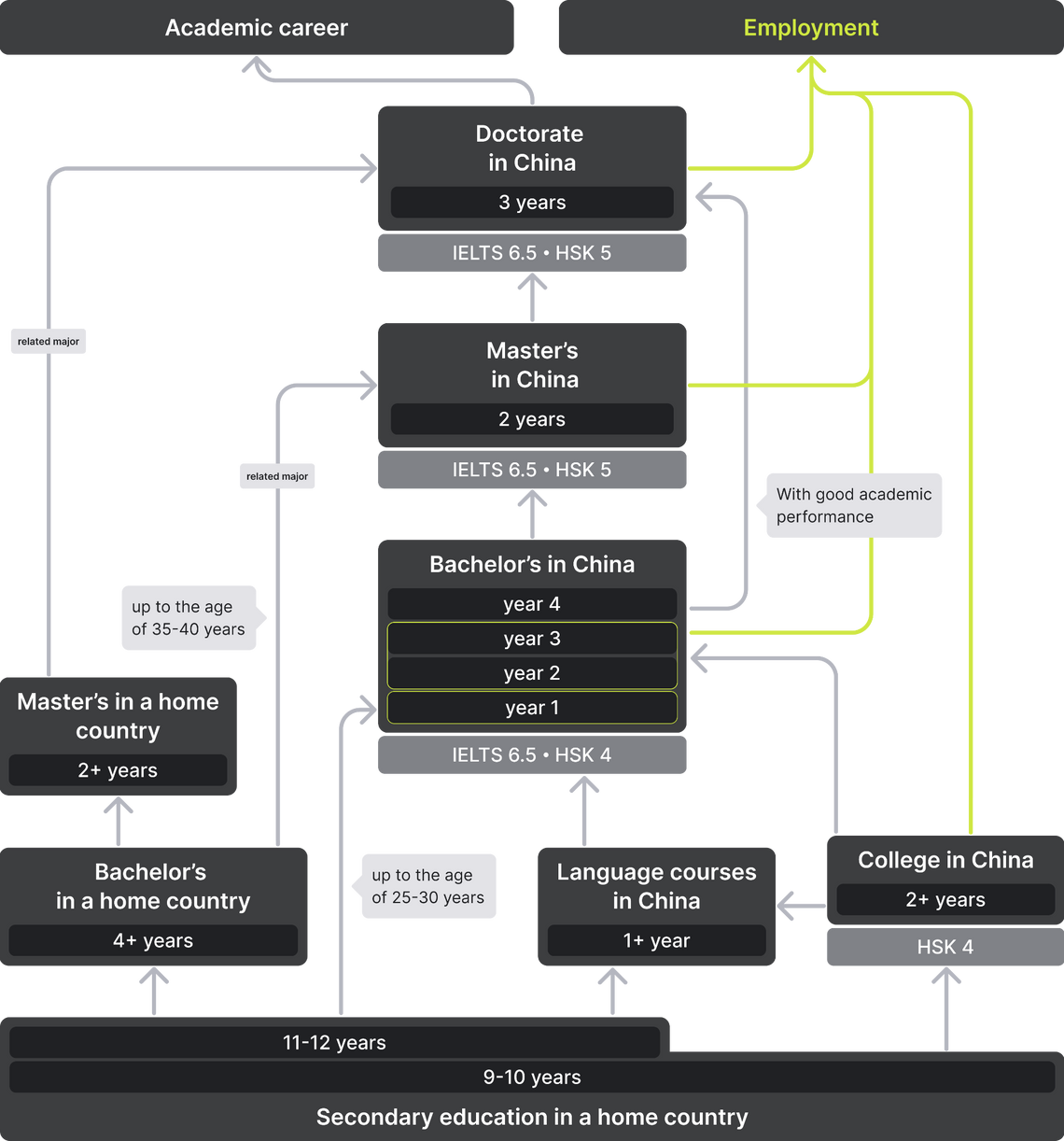Apply to a foreign university with confidence
- Properly fulfilled documents
- Perfect motivation letter
- Support from a personal mentor
- Offers from several universities
Article score: 4.11 out of 5 (9 reviews)
You can apply to Chinese university after 11th grade but there are age restrictions. We tell about this and other features in the article.
Free consultation







It is possible to enroll at Chinese universities, but only if you are young, healthy, and have a good reputation. These factors are so important that they are written out on the websites of universities and the visa center. Evaluations are made through health declaration forms, recommendation letters, and other documents. In addition, you must be proficient in Chinese or English.
Keep reading for more information on admission requirements.
We discuss the features of the Chinese education system in our separate article.
| Program | Age | Duration | Min. cost per year | Avg. cost per year | Exams |
|---|---|---|---|---|---|
| Bachelor's | 18+ | 4 years | 2,000 USD | 4,000 USD | HSK 4 / IELTS 6.0 |
| Master's | 20+ | 2 years | 2,300 USD | 5,000 USD | HSK 5 / IELTS 6.5 |
| MBA | 20+ | 1-2 years | 4,200 USD | 14,000 USD | HSK 5 / IELTS 6.5 |
| PhD | 20 + | 3-5 years | 4,400 USD | 5,500 USD | HSK 6 / IELTS 6.5 |
This table shows approximate costs. Verify the exact information on the websites of universities and other educational institutions.
| Expense | Average cost |
|---|---|
| Language exam | 48 USD |
| Student visa | 140 USD |
| Registration fee | 54 USD |
| Insurance | 82 USD/year |
| Hostel rent | 68 USD/month |
| Transportation | 12 USD/month |
| Meals | 203 USD/month |
| Study materials | 79 USD/month |


At prestigious universities in China, education costs an average of 3,811 USD/year. Flights and accommodation in the country are just as cheap. Granted, expenses play a small role when choosing a Chinese university. What other criteria should be considered?
Items 1-6 of 2,549
Advanced search
You can apply to Chinese universities online. There are two ways:
Documents can be submitted twice a year: from March to June for the fall semester and from October to January for the spring.
There are not so many admission requirements at Chinese universities. Of the main ones:
For bachelor's programs:
Additionally for master's and PhD programs:
All documents must have a certified translation into English or Chinese, depending on the program.
Most universities in China accept students without a diploma recognition procedure. But some, such as Tsinghua University, may require consular legalization. This can be done online[4].
There are two semesters in China:
However, deadlines may differ depending on the university.
| University | Deadlines |
|---|---|
| Peking University | April 30 / November 30 |
| Tsinghua University | December 15 / March 1 |
| Fudan University | June 15 |
| Zhejiang University | June 30 |
| Shanghai Jiao Tong University | March 31 |
Application deadlines are subject to change. Verify the exact dates on the official website of your chosen university.
You can apply for a bachelor's program on the website of the selected university or through Studyinchina. The second option is more convenient — the site has filters for specified criteria, and an application can be submitted to several universities at once. However, you have to pay separately for each application — about 82 USD.
Upon admission, you need to fill out an application and submit document scans. Usually, universities ask for a passport, a certificate of no criminal record, language certificates, motivation and recommendation letters. All documents must have a notarized translation.
Many bachelor’s programs have age requirements. The applicant must not be under 18 or over 25-35 years old. The upper threshold for adult students is different at each university , so be sure to verify this criterion.
At Chinese universities, the language requirements are quite high. To study in Chinese, you need an HSK 5 certificate. English-language programs are accepted with IELTS scores from 6.0-6.5. You can improve your language level in preparatory courses.

Students can apply to a Master's program through Studyinchina or directly fill out an application on the university’s website.
For master’s programs, there are age restrictions as there are for bachelor’s programs. Applicants who are not older than 35-40 may apply. There are not so many requirements for the level of education — usually, a bachelor's degree is enough. However, some universities conduct entrance exams in specialized subjects to assess the applicant’s level of education. They also require recommendation letters from professors and a motivation letter. On rare occasions, interviews are conducted.
Language proficiency must be HSK level 5 or higher for Chinese programs. For English-language programs — IELTS from 6.5.
Many universities also accept academic portfolios and CVs. While they are not often required, they can greatly increase your chances of admission. Admissions committees pay close attention to scientific publications and work experience in the field. It will also be an advantage to have GRE, SAT, or GMAT (for MBA programs) scores.
Students can enroll in a PhD program after both master's or bachelor's programs, but the requirements for academic performance will be higher for the latter. Regardless of the previous level of education, scientific publications and two recommendation letters from university will be required. Almost every university requires a motivation letter.
There are very few PhD programs in English. Plus, there is a lot of competition. Students are accepted with an IELTS score of 6.5. or an HSK 6 certificate. Though this is a high level, you cannot write a PhD dissertation without advanced knowledge of Chinese.

Language courses are popular among foreign applicants in China. Such a system is called "1+4": students intensively study Chinese for a year, pass the HSK, and then enroll in bachelor's, master's, or PhD studies.
You can attend courses without any knowledge of Chinese, but it is better to prepare in advance. Learning a language from zero to level 4 in a year is really challenging. It is preferable to already have some sort of foundation in place before you arrive in China.
It is worth enrolling in language courses at the same university where you further plan to study — of course, this is not a prerequisite, and no one will forbid you from applying to another university. However, you can get used to the professors and university setting more quickly. This will not give you an advantage in the admission process, but it will be a little easier.
So, choose a university first and then check if it offers language courses. Courses are always tuition-based, and the exact cost depends on the university. Minimum — 1,089-136 USD/year, maximum — 3,403 USD/year.
Click here for a list of universities that offer preparatory programs.
Higher education in China is relatively inexpensive. However, there are scholarships that can make it cheaper or even free. Applicants with excellent academic performance and a level of Chinese not lower than HSK 4 can count on them.

You will need a student visa to study in China. There are two types:
You can apply for an X1 visa after your formal enrollment at a Chinese university. The university administration will send you an invitation letter, along with:
You must then find a consulate where you plan to apply for your visa. The university will send it a confirmation of your enrollment and other required information about you. You will then be invited to the consulate to apply for a visa.
After entering the country on an X1 visa, you will need to undergo a medical examination. This is usually organized by the university. Only after that you can get a residence permit, which will allow you to live in China for the duration of your study, as well as leave and enter back into the country.
60+ countries
we work with
$1,000,000 saved
by students through scholarships
6,400 offers
our students got